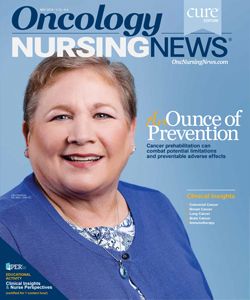The Day Planner
A nurse navigator uses a simple tool to help a forgetful patient overcome a barrier to care.
Penny Daugherty, RN, MS, OCN, ONN-CG

I met Doris (name changed), an older woman who had received a cancer diagnosis, in the emergency department of our hospital. She had called to let the hospital know she was coming, but after I’d been waiting for 30 minutes, she called again to complain loudly that I wasn’t there to meet her. When I asked her where she was, she began to scream and cry, insisting that she was at the front desk. She had gone to the wrong hospital.
This marked the first of our many encounters.
I connected Doris with my colleague, Megan Whittington, one of our cancer care liaisons (CCLs), who helped her arrange transportation to her first office visit with her gynecologic oncologist. I went to the office to be there for that first appointment, only to find Doris sitting in the lobby crying and saying she had no way home, when, in fact, Megan had arranged a round-trip ride, told the patient about it, and given her the phone number of the taxi company we use so she could let the driver know what time to pick her up.
Doris’s memory problems, lack of organization, and emotional volatility caused countless complications over the course of her treatment. When her chemotherapy began, she always forgot her scheduled times, as well as her lab dates. Her physician’s team was in constant contact with the hospital, as was her chemotherapy coordinator. We all tried our best to help Doris get to her chemotherapy appointments, follow-up labs, and injections. Megan, an incredibly patient and understanding CCL, experienced intense frustration, as did the physician’s team, who were managing a full patient load in their clinic, which served many indigent patients with multiple needs. Every single appointment for Doris involved several frantic phone calls (from Doris to us all), followed by each of us scrambling to make sure Doris understood the arrangements and actually got to her many appointments.
At Christmastime especially, Doris had a very hard time processing information and became extremely confused. But then a funny thing happened that would change Doris’s experience and ability to cope with her schedule.
I had ordered a day planner that was not the one I actually needed (in my haste, I didn’t read the description properly). The day it came, coincidentally, I received calls from Doris’s doctor and chemo coordinator pleading with me, as the oncology nurse navigator, to help Doris keep her schedule straight. That little day planner popped into my head. I wrapped it up in holiday paper, complete with a little bow and a greeting card, and I went over to the doctor’s office. When Doris came for her appointment, I presented it to her.
After she’d opened the gift—and cried because someone had thought about her enough to give her a gift—she and I sat down to go over how to use it to help reduce her frustrations with her schedule.
She called Megan to say how excited she was to have this beautiful day planner. From that day, she has kept her notes, has written down her appointments, and has been sure to let us all know that “it’s in my day planner.”
Yes, there are still days when I run all over our huge hospital campus to make sure Doris has what she needs or is where she is supposed to be, but she always reminds me that she has her precious day planner with her and she will always treasure it.
As navigators, we strive to help our patients traverse the complicated maze of treatments and appointments, as well as the terrifying uncertainty of their physically, emotionally, and mentally challenging journey. We constantly obsess about making things simple for patients, and we continually devise many tools/forms/devices—anything to help our patients.
That little day planner, ordered in error, proved to be not only a great help to our patient, but it also gave a lonely, impoverished woman a sense of worth and value—and, in her very solitary life where there are not often any holiday gifts for her, a feeling of being cherished. It really doesn’t get much better that that for any of us, now does it?




